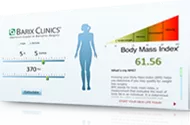Can bariatric surgery help correct or control my high blood pressure?
Sometimes taking control of your own health seems like an impossible feat. Thankfully, bariatric surgery can give you that control.
According to the University of Southern California, 75.4% of patients who had gastric bypass surgery experienced complete resolution of High blood pressure. More exercise, healthier food selections and high blood pressure recipes with less salt can also help fight hypertension.
If you are concerned about the effectiveness of bariatric surgery, consider the experience of Tammy W. and her journey to a healthier lifestyle. Tammy had hypertension and turned to Barix Clinics for help.
“My blood pressure went back to normal about a week after surgery and the metabolic syndrome is gone,” she says. “It’s been a year since my surgery and I am so glad that I made the decision to become a healthier me.”
Jamie D. came to Barix at age 24 and was already dealing with high blood pressure. “My blood pressure and cholesterol were elevated,” she said. “I had problems with my back. I knew these problems were just going to get worse. [After surgery] I look in the mirror and I can’t believe it’s me. I’m so much happier and healthier.”
High blood pressure, also known as hypertension, is a serious health risk. Often referred to as a “silent killer,” high blood pressure causes significant health problems when left untreated —especially in morbidly obese individuals. Let’s cover all the basics to help you understand the risks associated with high blood pressure and what you can do to prevent or control hypertension.
What is high blood pressure?
Blood pressure is the force of your blood pushing against the walls of your blood vessels. Your blood pressure is measured by two numbers:
- Systolic blood pressure (upper number) — indicates how much pressure your blood exerts against your artery walls when your heart beats.
- Diastolic blood pressure (lower number) — indicates how much pressure your blood exerts against your artery walls while your heart is resting between beats.
What happens inside your body when you have high blood pressure?
Even though you may not feel different, the force and friction of high blood pressure damages tissue in the arteries. Over time, a buildup of low-density lipoprotein — the “bad cholesterol” you often hear about — forms along arterial tears. Arteries become smaller as plaque and damage continue to increase. This forces the heart and blood vessels to work harder and less efficiently, and your blood pressure keeps going up.
How do you know if you have high blood pressure?
It’s hard to discern whether or not you have hypertension because you may not experience any obvious signs or symptoms. That’s why it’s important to know your systolic and diastolic blood pressure numbers. Pay close attention when you go to the doctor — and, if you believe you are at risk for high blood pressure, you may want to invest in an at-home monitoring device.
Compare your systolic and diastolic blood pressure numbers to these blood pressure benchmarks:
- Normal: Less than 120 over 80 (120/80)
- Prehypertension: 120-139 over 80-89
- Stage 1 High blood pressure: 140-159 over 90-99
- Stage 2 High blood pressure: 160 and above over 100 and above
- High blood pressure in people over age 60: 150 and above over 90 and above
What causes high blood pressure?
Researchers have not pinpointed the exact cause of high blood pressure, but they do know that there are several factors that can exacerbate the condition:
- Obesity. The extra fatty tissue in an obese person’s body forces the heart to work harder to push blood through the arteries. Regular exercise can help reduce the risk for obesity and High blood pressure.
- Smoking. Nicotine can cause your blood pressure and heart rate to spike. Smoking also hardens arteries and increases your risk for strokes and heart issues.
- Excessive salt or alcohol consumption. Regularly eating salty foods or drinking more than two alcoholic drinks per day can cause High blood pressure. Salt forces your body to retain water, straining your circulatory system; excess alcohol can cause blood pressure to increase while you’re drinking.
- Stress. Stress not only causes short-term blood pressure increases but also goes hand-in-hand with other hypertension risks — like overeating, excessive drinking and sleep problems.
- Old age. As blood vessels are damaged over time, you are at risk for high blood pressure — and the older you are, the more opportunity there is for damage.
- Genetics. Some people — particularly those with a family history of high blood pressure — are predisposed to hypertension issues.
- Chronic kidney disease. Damaged kidneys are unable to create the hormone that helps the body regulate blood pressure. Additionally, people who suffer from high blood pressure may experience kidney problems as the blood vessels to the kidneys become narrow, weak or hard.
- Adrenal and thyroid disorders. When the thyroid or adrenal glands have hormone-production problems, “secondary hypertension” — high blood pressure caused by the hormone issues — can occur.
- Sleep apnea. Individuals who suffer from sleep apnea are at higher risk for high blood pressure, and vice versa.
What happens if high blood pressure is left untreated?
The longer hypertension is ignored, the more likely it is that your arteries will suffer irreparable damage. This damage can leads to quality of life, health and mortality issues like:
- Stroke
- Heart attack / heart failure
- Vision loss
- Sexual dysfunction
- Kidney disease/failure
Am I at greater risk for high blood pressure if I am morbidly obese?
Obesity is a major contributing factor of hypertension. In fact, it’s a deadly combination that you need to take very seriously. The Framingham Heart Study suggests that approximately 78% of hypertension cases in men and 65% in women can be directly attributed to obesity.
Let’s talk about high blood pressure solutions.
If you’re experiencing high blood pressure or know you are at risk for obesity-related hypertension, take action. Barix Clinics can provide the help you need to eliminate hypertension and improve your quality of life. Start your new life today.





